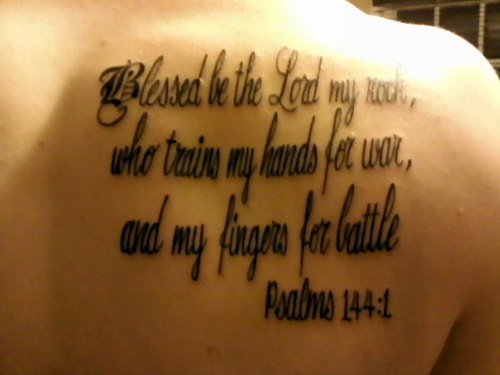Tattoo Bible Quotes Biography
Source(google.com.pk)Tattoos, beards, and consuming blood is mentioned in the Bible in Leviticus 19.26-28. These verses prohibit tattoos, trimming the edges of one’s beard, and consuming blood. Christians often find themselves puzzled as to what we should do with these types of verses. Are we allowed to have tattoos today? Well, that’s important for me since I’m covered in tattoos. Are we allowed to trim the edges of our beards? Should we let them grow out? Have you ever had a medium-rare steak with just a little bit of blood in it? I’ve provided an exegesis of this passage of Scripture in hopes to help others understand how we should understand this passage and provide insight as to how the Old Testament Law applies to us today.
Leviticus is the sequel to Exodus. At the heart of Exodus is the Sinai Covenant, though it is rarely mentioned in Leviticus Leviticus explains how covenant worship should be conducted (chs. 1-17), how the covenant people should behave (18-25), and then closes with a section of blessings and curses, entirely appropriate to a covenant document. The book enshrines the laws by which the religious and civil organization of the primitive theocracy in Canaan was to be regulated. Leviticus is given in a treaty format consisting of naming the suzerain, giving a historical prologue explaining the background of the treaty, stipulations, a document clause (covenant context), blessings and curses, and the divine witness. The historical situation is that God has just given His law to Israel after they had been redeemed from Egypt, not as a means for securing their redemption. God’s call for Israel to be His holy people preceded the revelation of the law at Sinai, but only obedience could make holiness a living reality. Holiness is not a means of removing the people from the world but of giving them a way to relate to the world as the people of God. Given the historical narrative of Exodus and the conquest of Canaan that surround Leviticus, the holiness codes in Leviticus 19.26-28 are instructions for righteous living. The book of Leviticus is about how the collective life of Israel is to be regulated and how God’s choosing of Israel from amongst all the peoples of the world is to be a “kingdom of priests and a holy nation.”
The opening prohibition is against “eating [with/over] the blood”. The preposition לא (al) in this idiom may mean “with.” This injunction prohibits eating blood with anything or, specifically, with meat. In the latter case, this prohibition would virtually be equivalent to “eat blood.” The objection with this interpretation forו(akal al, eat with) is that the object of the preposition is usually joined with a named substance that stands as the direct object of “eat.”Another interpretation takes to mean “over,” which may be a preferred interpretation in light of the historical context. This interpretation is held by the rabbis, giving לא a metaphoric sense of “eating of the flesh while the blood is still in the sprinkling bowl” –that is, before the blood has been offered to God on the altar. This interpretation is in accord with one of the basic tenets of the sacrificial system, that God must receive His portion (via the altar) before man.The enforcement of this law occurs in 1 Samuel 14.32 when Saul’s men are caught eating [with/over] the blood of animals sacrificed on the ground. Saul then improvises an altar (vv33-35) so that the slaughter of the animals will be a proper sacrifice. Leviticus 17.10-14 would provide the rationale of Saul’s action: the blood of slain animals must be drained on the altar to atone for human life. However, the intrusion of priestly sacrificial procedures into Saul’s story is suspect. It is unlikely that Saul had this in mind when he commanded an altar be made. If the interpretation of Leviticus 19.26a is to not eat meat with blood still in it than Saul commanding a stone to be brought as the altar is completely arbitrary because the context does not indicate that the death of these animals were to be sacrificial nor did Saul refer to them as sacrificial after his command to do so The troops were hungry and slaughtered the animals on the ground and ate them.
The “eat over” interpretation may not refer to the sacrificial system but to Canaanite pagan practices, which the Israelites were to avoid. In the worship of chthonic deities, the animal was sacrificed on the ground, rather than on an altar or stone, and the blood drained into a deep trench dug out near the place of sacrifice and was allowed to soak in before the meat from that sacrificial animal was eaten. This interpretation of Leviticus 19.26a is most likely what Saul was referring to and may also be connected to the purpose for the prohibition found in 26b.
Magic and divination practices were categorically condemned in the Old Testament The Israelites had access to information about future events only if God chose to reveal this information to them. Thus revelation is diametrically opposed to divination. There are many references and interpretations that are possible for divination. One possibility is the discerning of the future by interpreting signs and premonitions such as the movement of animals, smoke, rising from a censor, or the shape or movement of metals. Joseph used a goblet for divination (Gen. 44.2, 5, 15). Another suggestion is that the term for divination is related to ןזו (“cloud”), if that is correct than the future was determined by reading the movements of clouds.
It is unlikely that this passage is referring to clouds or divination the same way Joseph used it. It is more likely to refer back to the blood right in the earlier half of the verse. This blood rite was to draw the spirits to the surface and to enhance their power of foretelling. Since the following prohibitions concern some type of divination involving the use of blood, this interpretation (“over the blood”) has great weight. Jacob Milgrom cites Ramban stating:
They would pour the blood and let it gather into a pit. Demons would gather there, according to their opinion, and eat their tables to tell them future events… and the people (1 Sam. 14.33) would inquire of demons or of witchcraft to know their way and what to do. They would eat over the blood in order to perform this craft. Therefore, Scripture states, “[Saul] said ‘you have acted heretically’” (or “sinned against the Lord, 1 Sam. 14.33 NASB), that is, the Lord is wrought for you this day this great salvation, but you inquire of no gods. “This is heresy!”. Thus, the expression “eating over blood” may signify a form of divination, namely, chthonic worship involving the consultation of ancestral spirits, as developed with ancient Near Eastern parallels, especially from the Grecian sphere. This interpretation should be preferred in light of the historical context and theme of Levitic
Tattoo Bible Quotes For Girls For Men For Women For Guys Tumblr About Life About Family On Arm On Cehst

Tattoo Bible Quotes For Girls For Men For Women For Guys Tumblr About Life About Family On Arm On Cehst

Tattoo Bible Quotes For Girls For Men For Women For Guys Tumblr About Life About Family On Arm On Cehst

Tattoo Bible Quotes For Girls For Men For Women For Guys Tumblr About Life About Family On Arm On Cehst

Tattoo Bible Quotes For Girls For Men For Women For Guys Tumblr About Life About Family On Arm On Cehst

Tattoo Bible Quotes For Girls For Men For Women For Guys Tumblr About Life About Family On Arm On Cehst

Tattoo Bible Quotes For Girls For Men For Women For Guys Tumblr About Life About Family On Arm On Cehst

Tattoo Bible Quotes For Girls For Men For Women For Guys Tumblr About Life About Family On Arm On Cehst

Tattoo Bible Quotes For Girls For Men For Women For Guys Tumblr About Life About Family On Arm On Cehst

Tattoo Bible Quotes For Girls For Men For Women For Guys Tumblr About Life About Family On Arm On Cehst

Tattoo Bible Quotes For Girls For Men For Women For Guys Tumblr About Life About Family On Arm On Cehst

Tattoo Bible Quotes For Girls For Men For Women For Guys Tumblr About Life About Family On Arm On Cehst

Tattoo Bible Quotes For Girls For Men For Women For Guys Tumblr About Life About Family On Arm On Cehst

Tattoo Bible Quotes For Girls For Men For Women For Guys Tumblr About Life About Family On Arm On Cehst

Tattoo Bible Quotes For Girls For Men For Women For Guys Tumblr About Life About Family On Arm On Cehst

Tattoo Bible Quotes For Girls For Men For Women For Guys Tumblr About Life About Family On Arm On Cehst

Tattoo Bible Quotes For Girls For Men For Women For Guys Tumblr About Life About Family On Arm On Cehst
No comments:
Post a Comment